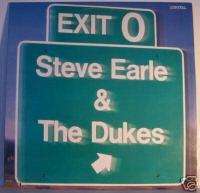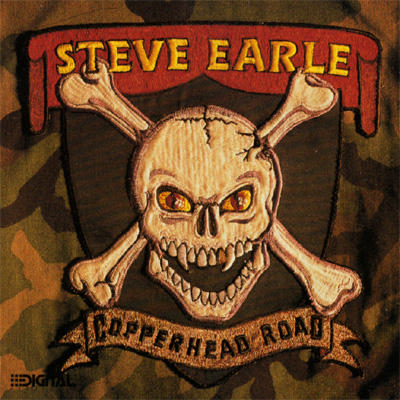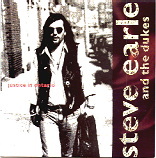
There's a marked change for 1988's Copperhead Road which is much dirtier, scuzzier and takes country rock as a foundation for some fantastic narrative lyrics. The whole album is much denser, much more interesting and sadly there's apparently no getting round the fact that both the music and Earle himself were more earthy and daring due to his heroin addiction, and interestingly (and refreshingly) it was getting off the heroin that later led him to make much, much better records. Anyway, from the opening notes (on a kind of synthesized bagpipe!) it's clear that Copperhead Road is a very different kind of record to Exit O or Guitar Town. It's still built on very modern country rock foundations, but it's the rock that's way in the foreground throughout. The songs are uniformly excellent, from the blistering redneck saga of the opening title track to the delicately drawn lovesongs ('You Belong To Me' which utilises a thundering drum track to great effect, and 'Once You Love' which should be maudlin soppy nonsense and is instead tough enough round the edges to be genuinely affecting). There's also a song with the Pogues, underscoring Earle's determination not to be categorised and also demonstrating his genuine interest in music as a form rather than a style. It's a great, blustering rock album and a sign that Earle's restless, drug-addled brain was trying to reach somewhere much more interesting than straight down the line good old boy country rock.

After the moderate commercial success of Copperhead Road, expectations were high for the follow-up, The Hard Way (1990). It absolutely bombed, partly because country radio wouldn't touch it (too much rock, too much left-wing sentiment), and Earle's drug addiction went into overdrive and he ended up being arrested a number of times and finally being sent to rehab. It's a shame because The Hard Way is a great album with some storming rock songs ('The Other Kind', 'Country Girl', 'Promise You Anything') and some great lefty narrative numbers (the furiously anti-death penalty 'Billy Austin' being the real standout). The Hard Way takes the various elements of Copperhead Road that were in rough form and builds on them in a really impressive way, and the songwriting on The Hard Way is really great, and Earle seems to have really found his own voice, where previously his days as a jobbing songwriter played too large a part in his writing. There's also a 12" of the song 'Justice in Ontario' which is another angry bit of political polemic, but not the strongest song and is too reminiscent of 'Copperhead Road'. The B-sides are live versions of album tracks but I can't find any of them on the net.


After five years in first a drugs haze and then a lengthy spell in rehab Earle came back with a vengeance, cleaned up and with a whole new zeal for writing. Train a-Comin' (1995) is a fantastic roots record, taking bits of folk, country and the blues and mixing them all up to create something very old-fashioned sounding, but brilliantly, quietly innovative. If you ignore the peculiar decision to try to reclaim 'Rivers of Babylon' from disco purgatory there is very little on the album that isn't really understatedly brilliant. The handful of covers are well chosen and Earle's originals show a whole new way of approaching this kind of roots music. Mostly acoustic, it's a deliberately un-rock way in which Earle chose to reintroduce himself to the world, I suspect because he was still associating those big rock records with being on heroin, but whatever the reason it was an extremely wise or clever choice because it got him some fantastic reviews and a lot more attention than would probably have been expected and ensured that his career would go from strength to strength over the next few years.

The follow-up, I Feel Alright (1996) is an even more confident record, and one which combines the raw rock approach of Copperhead Road and the more progressive country elements of Train a-Comin' to superb effect. I Feel Alright is a great rock record, which utilises acoustic underpinnings but still feels like a big rock record. It's great stuff. The country is still shot through the album, but none of this is ever going to be played on a country radio station. What's particularly impressive about the record is the way in which Earle is clearly addressing his own behaviour throughout, without a trace of self-pity and without lacking humour, he is simply and clearly analysing why he did the things he did and what the fall-out was, and it's very, very interesting. There's a nice balance between upright rockers and gentler ballad form songs, but each and every one shows someone completely in control of themselves and their material and it makes for a great album.

Slightly less immediately great, but still mightily impressive is 1997's El Corazon. Musically it's darker and grittier, less of the acoustic foundation, but it's also much more eclectic, which sometimes works in its favour, sometimes against. Opening with two gloomy mid-tempo rockers is possibly not the most engaging way of kicking off an album, but it does introduce the over-riding musical theme, and means that when 'If You Fall' starts it almost feels jaunty. Bearing in mind these are songs of the heart it's worth remembering that Earle's is prettily easily won (he's been married about nine times, no joke) and so presumably in matters of both love and addiction his heart has taken a fair amount of strain. There's a lot of stuff going on in El Corazon, not least a rediscovery of an affinity for country in its most traditional form and the song on which he is accompanied by the bluegrass Del McCoury Band led to them making a whole album of bluegrass songs together. It's a mix and sometimes a demanding one, but the simple honesty of Earle's expression of his complex personality and thinking is always impressive and always engaging, and the songs are always great.

Lots more Earle next week.
No comments:
Post a Comment